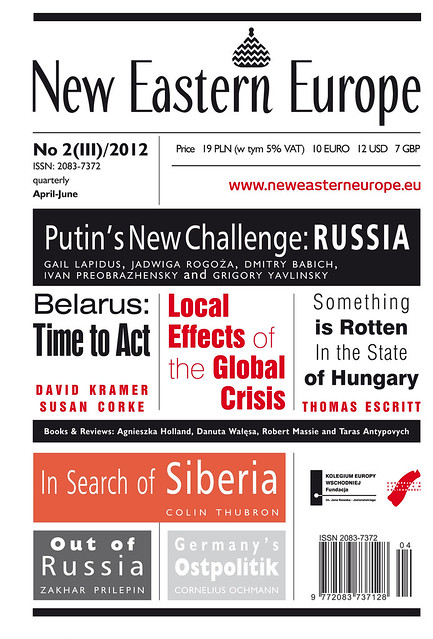March 2012 Newsletter
March 8, 2012 -
Example Author
-
New Eastern Europe newsletter

Welcome to the March 2012 newsletter!
With the date of March 4th 2012 having been firmly fixed in everybody’s mind for some time, we have been extremely busy here at the New Eastern Europe editorial office. The Russian presidential election passed without much of a change in most people’s expectations, but with the protests that followed and the reality of more to come, all eyes will be on Vladimir Putin as he tries to rebuild his damaged reputation. With this in mind, we are now proud to announce that the April/June issue of New Eastern Europe will feature a block of texts about Russia and the potential consequences of Vladimir Putin’s return to the Kremlin, as well as texts about Belarus, Hungary and the effect of the economic crisis on countries in our region.
April/June 2012: Putin’s New Challenge: RUSSIA
Russian political analyst and journalist Ivan Preobrazhensky notes in his text that the protest movement that emerged in December 2011 “is not a rebellion of hungry or unemployed people, but a protest of well-fed, successful citizens, a protest against a state which cannot claim very many successes”.
Polish analyst Jadwiga Rogoża affirms that what is happening now in Russia cannot be compared with anything that has already been experienced in the world today.
The recent diplomatic row between the West and Belarus highlights the ongoing strain in these relations. David Kramer and Susan Corke, of Freedom House, call on the West to take actions to catalyse democratic change in Belarus.
Similarly, the description of the state of Hungary’s democracy by political journalist Thomas Escritt, shows the vulnerability of a political system which has long been viewed as stable.
Also included in the new issue is a block of texts on the effects of the crisis on countries in the region initiated by economists from the World Bank, as well as texts by Dmitry Babich, Gail Lapidus, Zakhar Prilepin, Cornelius Ochmann, Katarzyna Kwiatowska and Ziemowit Szczerek, and interviews with Colin Thubron and Grigory Yavlinksy.
Online Extras
In addition to the print edition, our website contains articles which are only available online, as well as our regular column:. Ben Judah, Jana Kobzova and Andrew Wilson from the ECFR in This Week in the East. Linas Jegelevicius from the Baltic Times also continues his Baltic Spotlight, while Moscow-based journalist and political analyst, Dmitry Babich, is sure to be extremely busy with his Inside Russia blog.
We would also like to remind you that it is now easier than ever to buy New Eastern Europe. Subscriptions, single copies and back issues can now be bought at our online shop. You can pay by credit card (Visa and Mastercard) or bank transfer through our new, secure online payment system. A one-year subscription costs 32 euros (including priority shipping). For more information please visit (www.east24.eu/en_US/index) or contact subscription@new.org.pl If you order now, we will make sure you get the new issue before it hits the shelves!
For more articles and updates please visit our website www.neweasterneurope.eu. We are also on Facebook and Twitter!

































